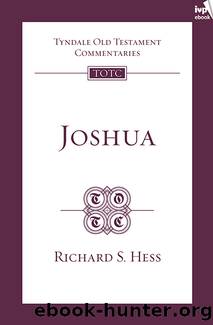Joshua by Richard Hess;

Author:Richard Hess;
Language: eng
Format: epub
ISBN: 9781783592241
Publisher: Lightning Source Inc. (Tier 3)
Published: 2014-12-19T00:00:00+00:00
a. Summary (10:7â10).
7. As the southern coalition obeyed Adoni-Zedekâs plea to come up, so Joshua responds to the same entreaty from the Gibeonites. Although the verb âto ascendâ (Heb. Ê¿lh) may simply describe an appearance on the scene, the location of Gibeon and nearby Nebi Samwel as the highest point in that region of the hill country implies that an ascent was probably necessary for both antagonists. As in verse 5, the respondents are first identified with a general statement (the five kings of the Amorites) and then with a specific description of each member of the coalition, so in verse 7 there is a general statement of the respondent, Joshua, which is followed by a specific description of who is involved, i.e. Joshua and his army. Joshua represents Israelâs army. This designation anticipates the Joshua and all Israel with him that occurs seven times in the chapter. It introduces each battle and concludes the whole account in verse 43, which, with verse 7, frames the participation of Israel. Thus verse 7 defines all Israel as used later in the chapter. It means the whole army under Joshuaâs command. That they were the best fighting men recalls the good fighters of Gibeon (v. 2). This description foreshadows their victory over the southern coalition, the quality of whose forces is never so described. A theme common elsewhere in the Ancient Near East is one where many opponents fight against a single, unified army.241 In Joshua as well, the unity and order of a single nation worshipping a single God with a united army under one personâs leadership is an advantage. Likewise, the unity of the church as the body of Christ under his leadership (Eph. 1:22; Col. 1:18) is emphasized both by Jesus (John 17) and his disciples (Acts 15; 1 Cor. 3).
8. The command âdo not fearâ recalls Joshua 8:1. Here also there follows a reference to the enemy and a promise of divine presence and support. The Gibeonites requested a hand (Heb. yad) in verse 6 (literally âDo not withdraw your handâ; NIV. Do not abandon). Joshua repeats it to his army at the rout of the enemy in verse 19. It refers to Israelâs military power to destroy their enemies and to preserve their allies. Behind this lies the gracious empowerment of God, who enables Israel to achieve success. The promise that no-one will be able to withstand you uses a verb, âto standâ (Heb. Ê¿md), that recurs in two important places: when the sun and moon âstandâ in verse 13 and again when Joshua addresses his army in verse 19, telling them not to stand still but to chase the enemy. With different subjects in each case, the verb relates the activities of God, of Joshua and of the enemy.
9â10. The strategy of an all-night march responded to the Gibeonite request for haste and facilitated the divinely ordained confusion of the enemy when they saw Israel appear out of the morning mists. Divine confusion of the enemy is described elsewhere in the Old Testament using the same verb (Heb.
Download
This site does not store any files on its server. We only index and link to content provided by other sites. Please contact the content providers to delete copyright contents if any and email us, we'll remove relevant links or contents immediately.
Zero to IPO: Over $1 Trillion of Actionable Advice from the World's Most Successful Entrepreneurs by Frederic Kerrest(4041)
Harry Potter and the Goblet Of Fire by J.K. Rowling(3604)
Machine Learning at Scale with H2O by Gregory Keys | David Whiting(3604)
Never by Ken Follett(3516)
Ogilvy on Advertising by David Ogilvy(3324)
Shadow of Night by Deborah Harkness(3169)
The Man Who Died Twice by Richard Osman(2801)
Book of Life by Deborah Harkness(2714)
My Brilliant Friend by Elena Ferrante(2697)
How Proust Can Change Your Life by Alain De Botton(2608)
0041152001443424520 .pdf by Unknown(2591)
Will by Will Smith(2572)
The Tipping Point by Malcolm Gladwell(2553)
How to Pay Zero Taxes, 2018 by Jeff A. Schnepper(2496)
Purple Hibiscus by Chimamanda Ngozi Adichie(2478)
Hooked: A Dark, Contemporary Romance (Never After Series) by Emily McIntire(2410)
Rationality by Steven Pinker(2146)
Borders by unknow(2115)
Daughter of Smoke and Bone by Laini Taylor(2076)
